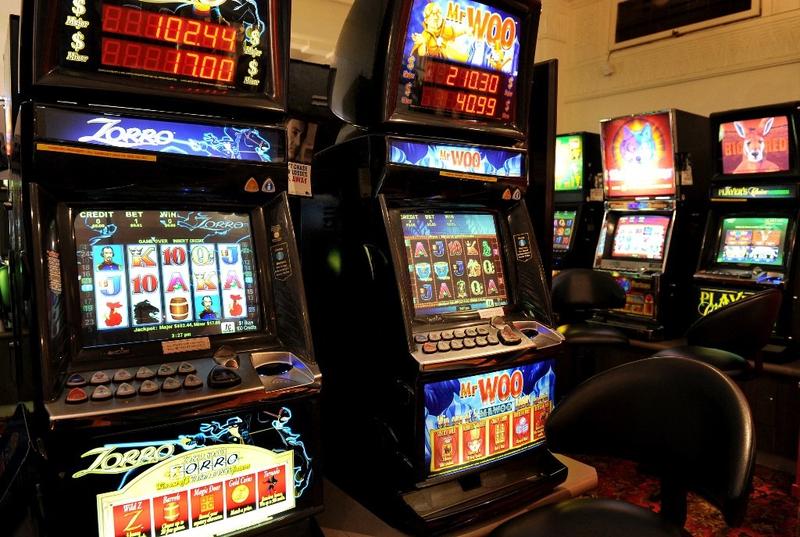 This file photo taken on April 13, 2011 shows a gaming venue with slot machines in Melbourne. (PHOTO / AFP)
This file photo taken on April 13, 2011 shows a gaming venue with slot machines in Melbourne. (PHOTO / AFP)
SYDNEY - When David McMillan stole A$5,000 from his dying father's small business last year, he knew it was time to kick a gambling habit that had consumed his life since he started emptying paycheques into slot machines at 17.
"It wasn't an intentional thing, but before I knew it there was no money left," said the 33-year-old air conditioning technician from Sydney, who has given control of his bank account to his sister.
"I will never go back to it ever," he added in an interview.
In what would be a world first move to tackle problem gambling and money laundering, the ruling party in Australia's most populous state and one of the world's biggest gambling centers, New South Wales, wants to make slot machines cashless.
Heading into a state election on Saturday, the conservative coalition has promised to rein in the powerful "pokies" industry in a jurisdiction with nearly one-tenth of the world's million machines, second only to Las Vegas.
Gambling losses per head in New South Wales are higher than anywhere else, meaning a switch to mandatory cashless machines would be closely watched by gambling regulators around the world. It is the first time gambling has been a key issue in a state election, challenging an industry that supplies more than 5 percent of state taxes
Gambling losses per head in New South Wales are higher than anywhere else, meaning a switch to mandatory cashless machines would be closely watched by gambling regulators around the world.
It is the first time gambling has been a key issue in a state election, challenging an industry that supplies more than 5 percent of state taxes and props up the welfare sector with A$100 million ($67 million) a year of state-subsidized grants.
In a state where the major political parties receive big donations from the gaming industry and gamblers annually put A$95 billion through poker machines, equivalent to one-seventh its gross domestic product, Premier Dominic Perrottet and his government have broken ranks.
He said he can no longer watch his state "profiting off other people's misery" and hopes the rest of the country follows. He plans to force all slot machines to go cashless by 2028, enabling gamblers to set loss limits in advance and making it harder for criminals to use the machines to launder money.
"For generations to come, it will reduce family breakdowns from problem gambling, it will stop money laundering occurring in our state, and ultimately we'll have a thriving industry," Perrottet told reporters.
His plan has raised hopes of anti-gambling campaigners, who blame the "pokies", planted in 2,300 venues across the state, for leaving hundreds of thousands of Australians financially ruined.
"This is the first time in our state's history ... that poker machine reform is actually an election issue," said Stu Cameron, CEO of Wesley Mission, a charity that supports the homeless, addicts and others.
"We are the epicenter of pokie machine addiction not just in Australia but across the world. The case for reform is there in the statistics, but more particularly in the stories of those lives that are harmed through pokie machine addiction," he said.
McMillan, the air conditioning repairman, said cashless machines alone could not stop problem gambling, but "I would promote any change that could help people".
It is unclear whether the measures will go through after Saturday's election as the main opposition Labor party is reluctant to support them.
ALSO READ: Pandemic sends Australia's gambling problem online
Most polls suggest Labor will win by a narrow margin, but political analysts say a hung parliament is possible, meaning Labor might have to negotiate with cross-bench members who support mandatory cashless machines.
Grassroots grip
The promised curbs could cut profit at the country's biggest pub owner and biggest holder of poker machine licenses, Endeavour Group Ltd, which has some 12,000 machines, by up to one-fifth, analysts say. Endeavour declined to comment but has said it wants to work constructively with regulators.
The plan is politically tricky not only because it involves taking on the gaming industry, but because hundreds of sport clubs and under-resourced non-profits have survived on A$1 billion in state-backed grants from the industry since the 1990s.
A welfare body that advised the grant program, the NSW Council of Social Services, quit involvement in 2021, citing governance concerns.
Since then, a quarter of its 400 groups have taken grants from slot machine interests, Reuters' analysis of publicly available documents showed, in a sign of the industry's grassroots hold.
"Clubs ... use it as a very powerful public relations tool to say to the world at large, 'we're fantastic corporate citizens, we are giving back to communities'," said the council's CEO, Joanna Quilty.
ClubsNSW said it would work with the new government on "evidence-based gaming reform measures".
READ MORE: Australia's housing crisis, largely hidden, is getting worse
Campaigners say the cost of harm from pokies outweigh grant benefits.
"Cashless gambling is a start, but I think pokies just need to go," said Tim Gray, a 42-year-old tour guide from Sydney, who took out high-interest instant loans to fund a decades-long gambling addiction before giving it up four months ago.
"We have a chance to really push for change this time."


